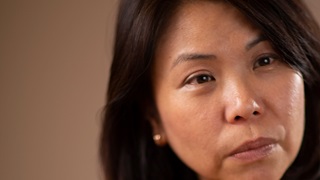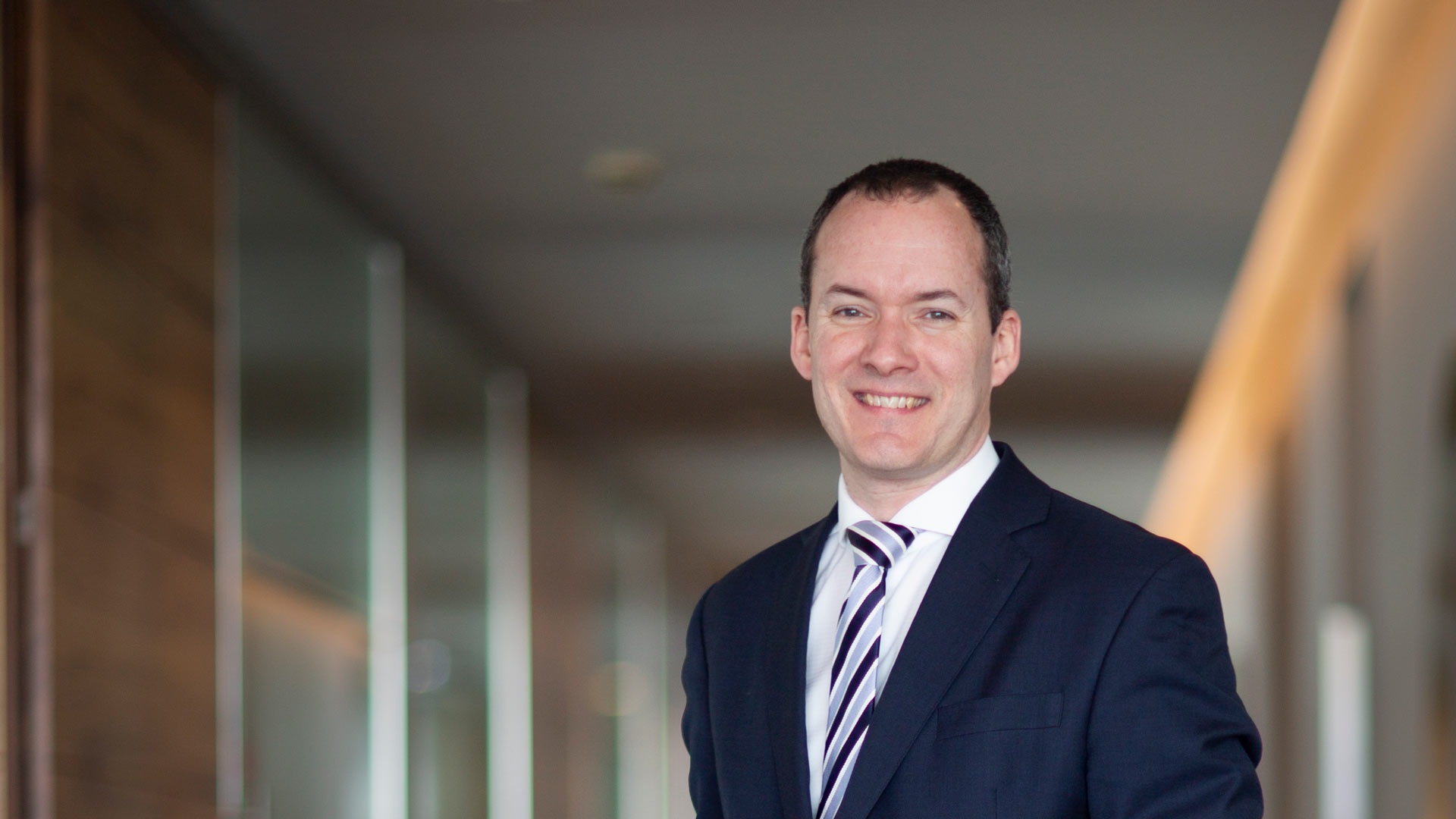
First person
Home to the spoken voice


Peter Scott—the managing partner of Norton Rose Fulbright’s Europe, Middle East and Asia practice—in conversation with Ingeborg Alexander in 2020
I had a really happy childhood. I grew up with this sense of confidence which, looking back and maybe looking objectively, you might think was misplaced.
Actually, I’m a good example of what I have to guard against myself, which is judging a book by its cover. You look on paper or you read someone’s CV and it appears, from their background, from their education, from their experience, that they must have certain characteristics. And then you meet them to discover that’s a completely false assumption.
I mean, if you look on paper, my dad’s father was a farm worker and my mum’s dad was a baker; her mum, my grandma, was a singer. But they’re very modest ‘Lincolnshire through and through’—never mind ‘English through and through’, this is ‘Lincolnshire through and through’.
I just couldn’t wait to leave, couldn’t wait to leave Lincolnshire. I wanted to get out, see a bit more of the world. I just wanted to find my way down to London.
Neither of my parents went to university. They ran a village post office. It was a perfectly comfortable existence.
It was quite a big village but everyone knew them and they knew most people, because as well as doing the post office my dad managed the Royal Mail delivery around the village, and he was on the parish council. We were well regarded and were probably, by the standards of the village, pretty well off. We didn’t ever feel like it was in any way disadvantaged. Every summer we went to Mallorca for two weeks. That was a pretty good arrangement.
The Methodist Chapel was very much a part of our family history. My grandparents were married there, and my parents. My grandma was the organist and choir conductor, my uncle was the Sunday School teacher, the family went there. There was a strong tradition. I went until Sunday morning football clashed, when I was eleven, and my personal attendance dried up a bit.
When I came home from school, my mum and dad would pop out of the post office for a quick cup of tea. The shop was shut at 5:30, we’d be eating at 6 or 6:30 as a family every night, and then my parents would do other stuff, whether that was parish council or school governor or whatever it might be, and my sister and I would do our homework; and we’d watch TV in the evening together as a family.
The village was in the catchment area of a grammar school that my mum had gone to and hated—so we opted out of the grammar school system and I went to a comprehensive school in Lincoln. They were all state schools but the comprehensive was non-selective. It was hardly the Badlands, you know, but it was quite different from my village primary school experience.
The school essentially was fed by one large council estate, called the Ermine East. I still remember one of the first Geography tests: the questions were quite straightforward, until I got to one which was: What housing estate is to the south of the school? The rest of the class all knew the answer because they’d come from it. I was from a village—I didn’t even know that there were such things as housing estates.
As a kid, growing up, you just accept your reality, don’t you; and you’re not necessarily well informed as to alternatives.
This was in the 1980s. No one was taught grammar at school, back then—to the point that, now, because the kids are taught every rule of grammar there is going, my wife and I are simply unable to assist in any way, shape or form.
I didn’t feel I fitted neatly into one of those sort of English class things: working class, middle class. My parents were probably on that journey. My dad left school at 16, was an electrician, took on running the post office with my mum, taking over from her parents. They were ambitious for me and my sister to carry on, so we got encouraged to do public speaking at school and to take up musical instruments. We never had a debate about, would you do A-levels or go to university. I think both my sister and I had no doubt we would.
I played the trumpet. You’ve got the option of going classical, in an orchestra, where you are, I would say, a low-frequency high-impact player that involves a lot of counting, and you don’t want to mess up on the counting because you’ve got about five notes to play and they’d better be in the right place. And then you’ve got jazz groups, and there was one called Jazz Vehicle, which was all about the brass. I was never good enough to be the lead trumpet but I got into the top bands and that was great, just good fun.
When I was 14, I did a GCSE in drama and that included having to review a couple of plays. We had a weekend trip down to London over Easter and I saw Les Misérables and Blood Brothers, which were both absolutely fantastic.
I was in quite a few plays. I was Dracula in the Christmas pantomime. Hardly a classic, but I went to the trouble of actually getting fake fangs fitted by the dentist. We put it on as a matinee for primary schools and about a dozen kids left, screaming. I took that as a mark of success.
I was still at school when Kenneth Branagh brought out Henry V. I think he wrote his autobiography in order to part fund the film. I read it. He was probably in his late twenties and he felt he could pull off writing the first part of his autobiography. I just thought he was this great role model.
There’s a fine line between a barrister and a stage actor—to the point where, in litigation, after your barrister is finished you have to say, ‘What a wonderful performance!’ You know, it’s the whole acclaim that goes with it.
I did placements in law firms and a couple of barristers’ chambers.
When I saw how much you got paid as a newly qualified solicitor at the big City firms—which was about as much as my parents combined were bringing in—and then the prospect of getting paid significantly more as you advanced; and the fact that the firm you got your training contract with would pay your way through law school, including a maintenance allowance… that was hugely influential. Most of the people I had been at school with had left school to get a job, and I had a sense from a young age of not wanting to be a burden. I wanted to pay my way.
Moving down to London and joining a big City law firm was a completely new experience. I had no connections to the law, I had no connections to London, certainly not the City of London, I didn’t even know what these traders or merchant bankers did. I didn’t have any kind of proper understanding of the world that I was entering.
I remember as a trainee going for a meal with clients where they were eating sushi. I’d never experienced sushi.
I’ve been doing some thinking during lockdown—about being a white man in the market that we operate in. I’ve always thought of myself as a bit of a challenger against some of that ‘tradition’ and those barriers around class and wealth… and yet I’ve been accepted, been given the benefit of the doubt, been given opportunity. I’ve got to accept it may well be because I look the part, I’m a tall white man, I sound the part, I give assurance to people that I’ve ‘got this’, I’m one of you, I can manage this. And so in many respects I’m a consummate insider.
And yet I’ve never felt that I am one of, let’s say ‘them’, in the sense that I’ve always associated ‘them’ as being that more affluent and privileged class.
Charlotte and I met at university. We were both studying law. Charlotte was made partner a year before I was. She changed all of that years ago when the children were born—she decided to go from being a partner in a law firm to being a mum at home.
I look back at what compromise I have made and the answer is, I haven’t compromised at all, or not much, not from a work perspective. That’s how it feels at times. I go to work (well, of course, at the moment I go upstairs, mainly) and I’m ‘away for the week’ and back at weekends. Lockdown has allowed for a slight rebalancing, which I’m really glad of. The fact that I can see the family at the start and the end of the day, including for an hour in the evening when we eat together, that is something I never thought I’d get the opportunity to do. It means a huge amount.
When I was a junior lawyer, going back home for the first time, I really appreciated what I had growing up—but that’s going back for a weekend. I like going back for things like family weddings, I love seeing the family, but I couldn’t imagine living there again.
If you’d said to me that I’d live in a town in the stockbroker belt outside London, I would have thought, no chance, that’s not what I want at all—and yet just in our street in Harpenden there are probably three other families who have a similar background to ours.
Wesley plays the trumpet, which I have picked up again to keep him company, and our daughter, Madeleine, plays the flute and the saxophone. We’ve got Spotify, which is fantastic. I like to demonstrate to the kids I’m still ‘on it’ when it comes to the music.
I’ve kind of applied a formula of working hard, being true to who I am.
© Norton Rose Fulbright LLP 2025